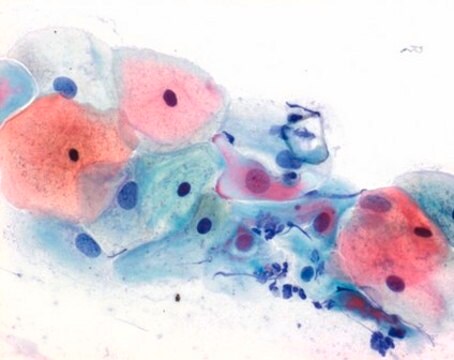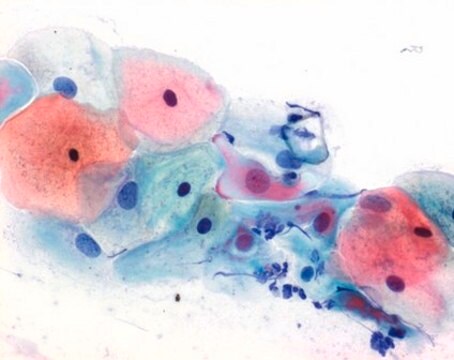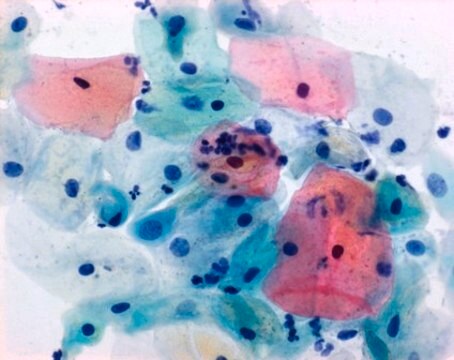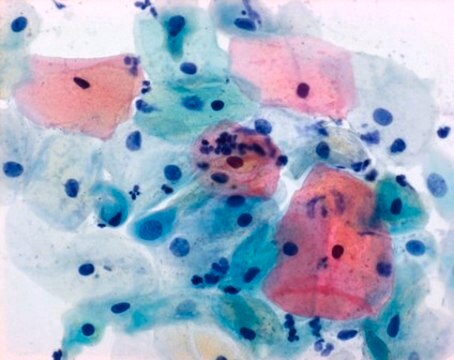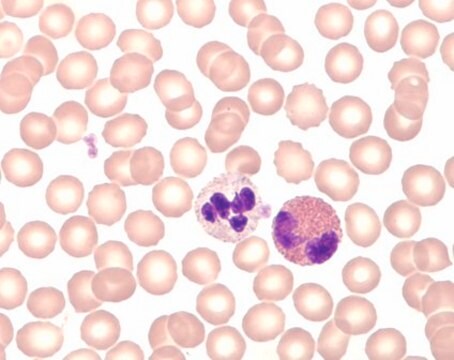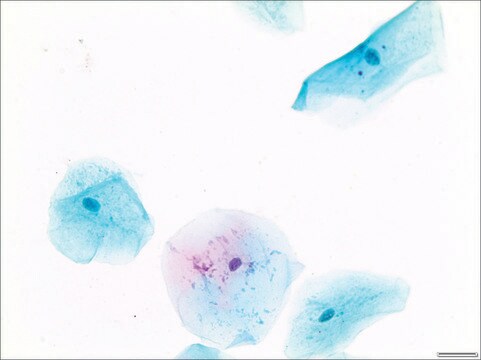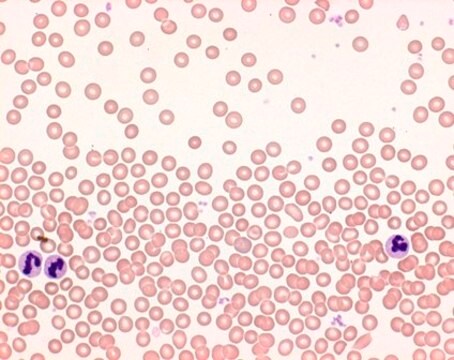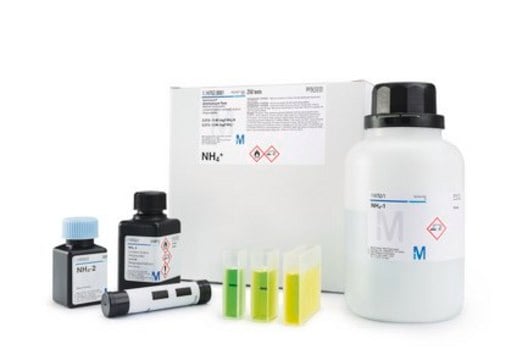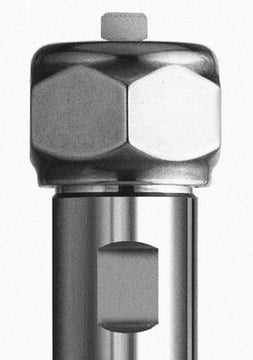1.09269
Papanicolaou′s solution 3d polychromatic solution EA 65
for cytology
Zaloguj sięWyświetlanie cen organizacyjnych i kontraktowych
About This Item
Kod UNSPSC:
41116113
NACRES:
NA.77
Polecane produkty
Poziom jakości
Formularz
liquid
IVD
for in vitro diagnostic use
temp. przejścia
flash point 17 °C
gęstość
0.85 g/cm3 at 20 °C
Zastosowanie
clinical testing
diagnostic assay manufacturing
hematology
histology
temp. przechowywania
15-25°C
Powiązane kategorie
Opis ogólny
Papanicolaou′s solution 3d polychromatic solution EA 65 - for cytology, is a ready-to-use solution used for human-medical cell diagnosis and serve the purpose of the cytological investigation of sample material of human origin, for example, gynecological and clinico-cytological specimen materials. Papanicolaou′s technique is the most used staining procedure for cytological specimen is and is intended for the the staining of exfoliative cells in cytological specimens. In the first step, the cell nuclei are stained either progressively or regressively with a hematoxylin solution, (Hematoxylin solution modified according to Gill II, (Product number 1.05175), Papanicolaou′s solution 1a Harris hematoxylin solution, (Product number 1.09253) or Papanicolaou′s solution 1b Hematoxylin solution S, (Product number 1.09254)). Nuclei are stained blue to dark violet. In the progressive hematoxylin staining method, staining is carried out to the endpoint, after which the slide is blued in tapwater. With the regressive method the material is over-stained and the excess of staining solution is removed by acid rinsing steps, followed by the bluing step. The structures of nuclei are more differentiated and better visible by the regressive method. The second staining step is cytoplasmic staining by orange staining solution (Papanicolaou′s solution 2b Orange II solution, Product number 1.106887 or Papanicolaou′s solution 2a Orange G solution (OG6), Product number 1.06888), especially for demonstration of mature and keratinized cells. The target structures are stained orange in different intensities. In the third staining step is used the so-called polychrome solution, a mixture of eosin, light green SF and Bismarck brown, (Papanicolaou′s solution 3a polychromatic solution EA 31, (Product number 1.09271), Papanicolaou′s solution 3b polychromatic solution EA 50, (Product number 1.09272), Papanicolaou′s solution 3c polychromatic solution EA 65, (Product number 1.09270), or Papanicolaou′s solution 3d polychromatic solution EA 65, (Product number 1.09269). The polychrome solution is used for demonstration of differentiation of squamous cells. Papanicolaou′s solution 3d polychromatic solution EA 65 gives a delicate, blue-green-pinkish staining result in clinical specimen material.
The 100 ml bottle provides 300 - 400 stainings. It is registered as IVD and CE certified product and can be used for clinical diagnostics. For more details, please see instructions for use (IFU). The IFU can be downloaded from this webpage.
The 100 ml bottle provides 300 - 400 stainings. It is registered as IVD and CE certified product and can be used for clinical diagnostics. For more details, please see instructions for use (IFU). The IFU can be downloaded from this webpage.
Komentarz do analizy
Suitability for microscopy (Vaginal smear): passes test
Nuclei: blue to dark violet
Cyanophilic cytoplasm: blue-green to blue-grey
Eosinophilic cytoplasm: pink to red-violet
Nuclei: blue to dark violet
Cyanophilic cytoplasm: blue-green to blue-grey
Eosinophilic cytoplasm: pink to red-violet
Ta strona może zawierać tekst przetłumaczony maszynowo.
Hasło ostrzegawcze
Danger
Zwroty wskazujące rodzaj zagrożenia
Zwroty wskazujące środki ostrożności
Klasyfikacja zagrożeń
Eye Irrit. 2 - Flam. Liq. 2 - Skin Sens. 1
Kod klasy składowania
3 - Flammable liquids
Klasa zagrożenia wodnego (WGK)
WGK 2
Temperatura zapłonu (°F)
62.6 °F
Temperatura zapłonu (°C)
17 °C
Certyfikaty analizy (CoA)
Poszukaj Certyfikaty analizy (CoA), wpisując numer partii/serii produktów. Numery serii i partii można znaleźć na etykiecie produktu po słowach „seria” lub „partia”.
Masz już ten produkt?
Dokumenty związane z niedawno zakupionymi produktami zostały zamieszczone w Bibliotece dokumentów.
Nasz zespół naukowców ma doświadczenie we wszystkich obszarach badań, w tym w naukach przyrodniczych, materiałoznawstwie, syntezie chemicznej, chromatografii, analityce i wielu innych dziedzinach.
Skontaktuj się z zespołem ds. pomocy technicznej